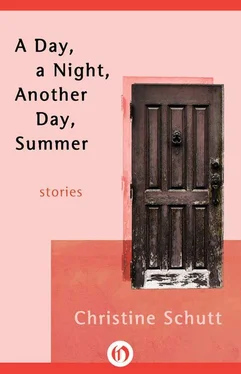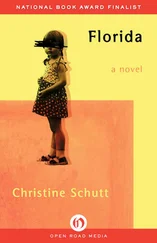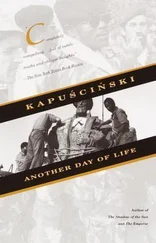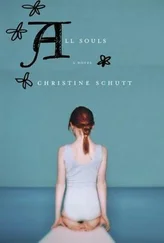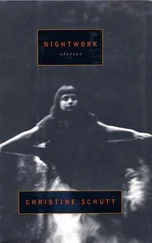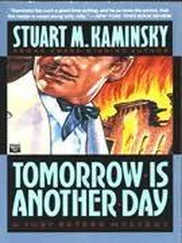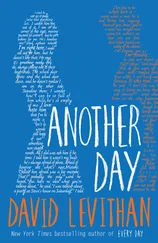SUMMER
“Whatever you want,” he says. “I’m painting.”
The ceremonies are over; it is summer and he is painting. Hatless, shirtless, he is on the ladder rolling paint on the mildewed cottage ceiling. Paint catches in his hair and in the hair on his arms and in the saddle of his back. He is paint-flecked with a color called French white. He is pollinated, a flower, dusted.
Look at him, the way the paint washes off in the water’s blast, swashing down his face, his malleable face, the tolerant mouth turned up at the ends, the eyes that when he smiles pleat sweetly — no other word for it. He is such a boy. The way he is about water, how he likes to stand in it.
The waters off Penobscot are sun chinked and cold; nothing skits the surface that might bite. The surface is a mirror to mirror the spruce tipped toward it, and the pink-cliffed shoreline blushes deeply. At sunset he swims. His heavy arms break water. His heavy, lifting arms are mostly water, and the water is cold; she has felt it; and when he wobbles out of the water over the mussel-stuccoed shore, he makes the noise of someone cold. He huffs and grins at what he has just done.
But what he has not done! He has not finished…and not finished, not finished reading Ulysses or even started the Thoreau. He is wall building in the garden still; he is walking the island, going out in the boat. “See where he is?” She points for the children. “He is at the water after stones for the wall.” See? He hefts a stone on his shoulder and holds another at his hip up the hill to the low wall with its band of black-eyed Susans.
How is it he carries these stones but easily, lightly? Oh, he is so perfectly good! He is the way, she thinks, a hero should be.
FALL
Late August — is summer so short and over? It is cold enough this morning for a fire! The rain clouds the fields, and the blown fog boils until they leave the cottage and it lifts. “Can you see?” she asks. The barrens have begun to redden, and the goldenrod wags gold.
Oh, snatch past reds that in passing smear! Shut your eyes on the sumac!
“Go fast,” say the children when the sudden road cleared invites them.
The flawless man’s hands and his arms and the hair on his arms, she takes pleasure in the sight of his arms when he is driving them back to the onrush of the city — September, October, November! Binders, apples, pencils, socks — so fast and already they are home, home, where an unexpected face she wears streaks past familiar mirrors and dismays her. Although he says…he says such things — oh, it embarrasses her what the flawless man says, and she wants to believe him. She does believe him!
Of equable temperament, generous, upright, faithful, kind: the flawless father, lover, friend is all of these; and his hands, turned outward, are cupped for her. Yes, she likes to be done to, she likes to be bossed and made to feel what she feels — fleshy, cleft, insatiable, a bit of a tramp on the spit of his hand, the same hand deft enough to catch in passing a doll the boys have twisted into splits.
He swipes up the doll — so much hair on a stick — and ever the flawless uncle, he shuts the doll’s legs and smooths her dress and says to the owner, “Avoid the boys. Come sit by the fire and play near us,” and when the girl goes home, the boys take her place and loll by the heat on their bellies, pushing trucks. The fire stuns them. Their cheeks are flushed, and when she finger combs their hair, their hair is wet. “Go to bed,” she says, and the flawless father walks them.
Falling and falling all night into sleep, the boys are noisy breathers and kick at their covers.
How has it happened they have these boys is something she likes to say, and she says it, walking to where he is sitting in front of the fire, “How is it we…?” So much of what she says at night goes unfinished. She would rather kiss and be kissed and watch the soft collapse of cindered logs in the darkening room where they are themselves greater darknesses, touching.
WINTER
Lap robes and cushions and candlesticks, greenery and oranges, spiky flowers, rows of things red, silver bowls of Christmas bulbs, decorations made of candies, these are some of the jammy comforts attached to this time when radiator heat squiggles palpably and whitely in the room. “Aren’t you thirsty?” she asks the flawless father, and she asks the boys; but the boys go on gouging chocolates and sucking out the cherries. Their lips, when she licks them, are sweet.
And other parts of them are sweet. The pocked baby parts of their hands, the sugared wells between their fingers, the boys are grooved for licking and taste good.
What makes her so special except that she is, yes, surely, look at the unfolded body the flawless man helps her keep: how he comes up from behind her, and the urgent first abrasive pleasure is a pleasure she would like to repeat even as it happens, so that she does. Her body flashes in the mirrored door where the city floats in the white light of winter, in the pink of spring, soft June, the heat wave that shrivels, August, October; the city wakes, rises, backdrops the dark head pressed against her breast.
Is it any wonder she is dizzy?
Shouldn’t she be afraid?
THEY TURN THEIR BODIES INTO SPEARS
I
On the first night they took her to the locals’ favorite for lobster, she got sick, and they consoled her home with excuses. It must have been the boat to the island and the egg-white scum that spilled from the claws when she cracked them. It must have been the distance she had traveled to visit. Imagine their surprise! Suddenly their daughter’s girl knocking open the screen door, carrying a string bag of oranges, a few clothes, and some tapes, no plans, but an appetite, it seemed, for what the island fetched up in traps. Lobster, her favorite, although the face she wore on their walk back home was cast down and waxy. Ellen put her to bed while he looked at the sky and thought how sad a girl could be at twenty.
He was eighty. He had lived long enough to see the children’s children shrivel into age, and he wanted to tell his granddaughter what it meant, really, to be eighty and alive.
“That old!” she gasped when in the morning they spoke.
“Yes, I am, and I know things. Be happy. Don’t wait.”
He struck up the fire and stayed squatted to watch it take; in the kitchen Ellen frittered at their breakfast. Eat, drink. This was a treat for them, Ellen was saying; it was not every day their granddaughter visited, and they were happy to see her. Happy again, the word sprung wild as the islands regal wagging, fields of weedy purples and golds, red geraniums against the chalky houses. Their umpteenth summer here alone, his and Ellen's, and they woke to the weather, pleasure bent.
Old folks’ pleasure, maybe; maybe that was what the girl would call it. Seed-dry and slow — too many books, no TV; birds their only entertainment. Old folks they were with old folks’ ways. The temperature’s night plummet meant it was cold when they awoke, and he often made a fire.
He had been laying kindling when the girl scuffed in, wearing a blanket — no robe — next morning.
“Charlotte!” Ellen said. “Aren’t you cold?”
No, thank you, yes, thank you, no was his granddaughter speaking — the darling! Look at the bits of cloth she wore when she was dressed. No breasts. Jutted movement, bones — her bones, Charlotte’s — were handles, too visible. She had what so many girls had that made them turn their bodies into spears. Wing blades and wrist bones, bones, bones, a girl distinctly outlined, her eyes were fixed on the water.
“I haven’t been here in such a long time,” she said.
Читать дальше
